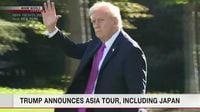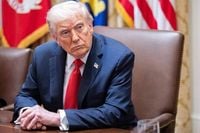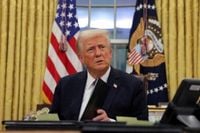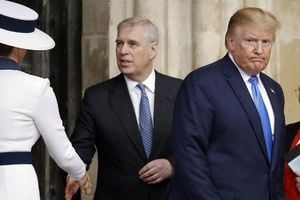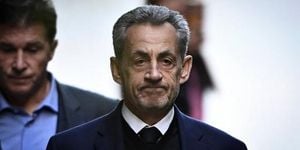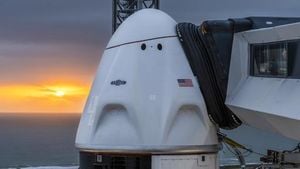President Donald Trump is preparing to embark on his first official trip to Asia since beginning his second term, a journey that could have far-reaching implications for the global economy, U.S. trade policy, and diplomatic relations across the Pacific. The trip, which is set to begin at the end of the week of October 21, 2025, will see Trump visiting Malaysia, Japan, and South Korea—three countries pivotal to America’s strategic interests in the region.
According to the Associated Press and multiple other outlets, the Asia tour comes at a moment of considerable uncertainty. Trump’s improvisational style, which has defined much of his second term, is once again on display. The White House has offered few details about the itinerary, and even seasoned Washington observers are left guessing about the outcomes of key meetings—especially the much-anticipated sit-down with Chinese President Xi Jinping. As Bonnie Glaser of the German Marshall Fund told the AP, “The whole trip has seemed so uncertain from the beginning.”
The stakes are high. Trump’s approach to Asia has centered on using tariffs to force what he calls “fair” trade practices, a strategy that has rattled American industries and left U.S. allies anxious. The trade war with China, which has ebbed and flowed over the past year, is poised to take center stage once again. Trump himself has acknowledged the delicate balance, stating, “I have a very good relationship with President Xi of China,” but adding that any reduction in tariffs would require significant concessions from Beijing. Specifically, Trump wants China to buy more U.S. soybeans, crack down on the flow of fentanyl ingredients, and lift restrictions on rare earth mineral exports—materials critical for high-tech manufacturing.
Despite the tense backdrop, Trump struck an optimistic note at a recent White House press conference with Australian Prime Minister Anthony Albanese. “We will make a fair deal. I want to be good to China. I value my relationship with President Xi very highly,” Trump told reporters. He went further, predicting, “I think we’re going to end up having a fantastic deal with China. It’s going to be fantastic for the entire world.” (AP, CNA, Kyodo News)
The tour kicks off in Malaysia, where Trump will attend the Association of Southeast Asian Nations (ASEAN) summit. The summit, which begins on October 26, 2025, gives Trump a chance to highlight his administration’s peacemaking efforts in the region. According to the AP, the U.S. and Malaysia have been working to secure an expanded ceasefire in the region, and the Malaysian foreign minister has indicated that Trump “looks forward” to signing an agreement at the summit. This marks only the second time Trump has attended the ASEAN summit during his presidency, after skipping a virtual session during the COVID-19 pandemic.
Trump’s next stop is Japan, where the political landscape has shifted dramatically. Conservative Sanae Takaichi was elected on October 15, 2025, becoming Japan’s first female prime minister. Trump is expected to meet Takaichi during his three-day stay in the country. The relationship between the two leaders will be closely watched, as Trump had a close rapport with former Prime Minister Shinzo Abe, whom Takaichi considers a mentor. Michael Green, a former National Security Council official, told the AP that Takaichi “has the potential to also play that role,” but noted that Trump’s relationships with Asian leaders have yet to reach the same depth as those he’s forged elsewhere.
While in Japan, Trump will also address American service members at the U.S. naval base in Yokosuka, near Tokyo. This gesture underscores the enduring military ties between the two nations, even as economic negotiations take center stage. Earlier this year, Washington and Tokyo reached a trade agreement that included a promise of $550 billion in Japanese investments in U.S. projects—a significant vote of confidence in the American economy.
After Japan, Trump will head to South Korea, where the Asia-Pacific Economic Cooperation (APEC) summit is being held at the end of October. This leg of the trip is expected to be the most consequential. Trump is scheduled to meet with Chinese President Xi Jinping on the sidelines of the summit, and the world will be watching closely to see whether the two leaders can defuse ongoing trade tensions. Trump has said that the situation in Taiwan will be among the topics discussed, a nod to one of the most sensitive issues in U.S.-China relations. He also mentioned plans to visit China early next year, expressing hope for a “very good relationship” between the two countries.
The uncertainty surrounding the Trump-Xi meeting is palpable. Rush Doshi, a former China policy adviser under President Joe Biden, told the AP there are three possible outcomes: “deal, no deal or disaster.” Doshi noted that China feels emboldened after Trump backed down on earlier tariff threats when Beijing restricted exports of rare earth magnets. “The Chinese feel they have President Trump’s number,” Doshi said. “They feel that if they push on this, he’ll fold.”
Meanwhile, South Korea is grappling with U.S. tariffs that could have a devastating impact on its auto industry. Trump is pushing Seoul to create a $350 billion investment fund, similar to the one agreed upon with Japan, but South Korean officials have so far balked at the proposal. Wendy Cutler, a former U.S. trade negotiator, told the AP, “There’s some momentum to the talks. But I don’t want to overstate it, because there are some fundamental differences about this fund that need to be sorted out.” She added that while last-minute negotiations are common, “there are so many balls in the air.”
Despite the uncertainty, some analysts see opportunities. Anthony Kim of the Heritage Foundation said that both Japan and South Korea are eager to solidify partnerships with the U.S. “The message from them has been ‘let’s sit down, talk about relevant details to make a deal,’” Kim told the AP. Trump’s downsized foreign policy team and reliance on a core group of loyalists, however, have left some experts worried that the administration may lack the bandwidth to manage such a complex diplomatic mission.
As Trump prepares to board Air Force One for Asia, the world is left waiting for answers. Will the president’s trademark unpredictability yield breakthroughs or deepen existing rifts? Will his meetings with Xi Jinping and other leaders calm the waters or send new shock waves through the global economy? For now, as Anna Kelly, a White House spokesperson, put it: “Stay tuned!”
Whatever the outcome, Trump’s Asia trip is certain to be a defining moment for his second term—one with consequences that will echo far beyond the region.
